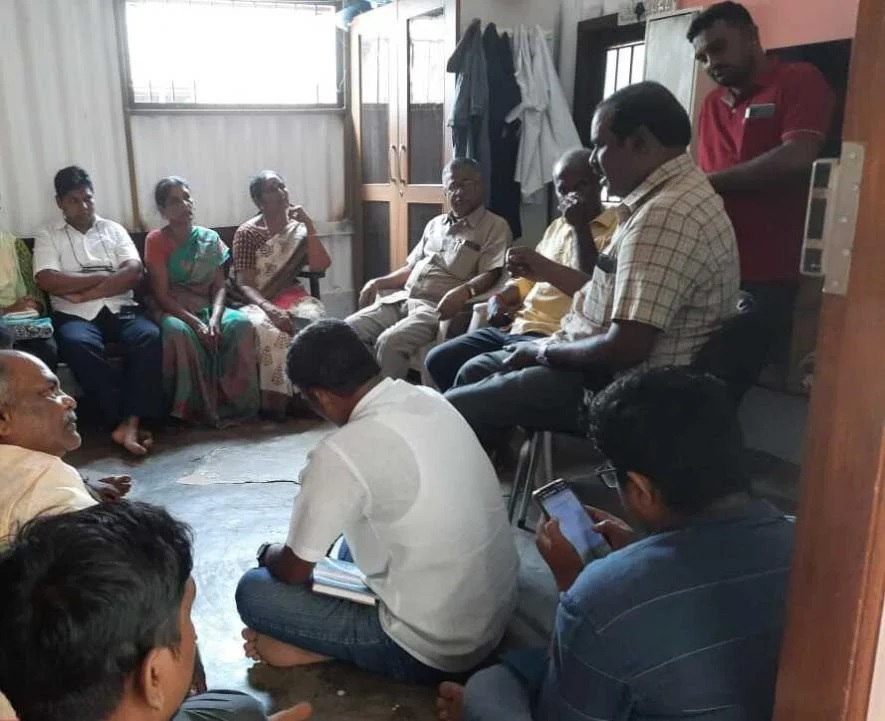
Photo: TNUEF leaders meet Kalidas’ family members.
Chennai: Lakshmi (48) lost her job and became homeless the same day her husband Kalidas (52) died on July 29. He died of asphyxiation after inhaling poisonous gases while cleaning a ring-well in Kallukuttai, near Perungudi in Chennai.
Lakshmi worked as the caretaker of a farmhouse along the East Coast Road (ECR) on the outskirts of Chennai for over five years. Her employers removed her from work and sent her home upon hearing about Kalidas’ death.
Unemployed and homeless, Lakshmi is now residing at her daughter’s house, along with her son-in-law and two grandchildren. She hopes the government would provide her with due monetary relief.
However, the police have not filed an FIR in this case under the Prohibition of Employment as Manual Scavengers and their Rehabilitation Act, 2013. The Tamil Nadu Untouchability Eradication Front (TNUEF) is taking steps to register an FIR and ensure that compensation of Rs 10 lakhs is granted to the legal heir of the deceased.
A month after the fatal incident, NewsClick visited Lakshmi and other family members of the deceased to learn about their present situation.
A NORMAL DAY TURNED FATAL
Kalidas and Lakshmi lived on the premises of the farmhouse they were maintaining until the former’s death. Simultaneously, Kalidas worked as a manual scavenger whenever he got called for work.
“From time to time, my husband was summoned to remove blocked drains, and he was paid around Rs 500,” said Lakshmi.
She said, “On July 29, Saravanan came on a two-wheeler around 1 pm to the Panaiyur mainroad to pick up my husband for work.” Kalidas died while cleaning the ring-well in Saravanan’s house. When Saravanan saw Kalidas lying unconscious, he jumped into the well; he also inhaled the poisonous gas and fell unconscious.
“By 3 pm, I got a call from the police saying my husband was dead. I caught an auto and hurried towards Perungudi,” she said. It is a distance of around 12 kms.
“By the time I reached, he was being taken in an ambulance to the government hospital in Royapettah. I stopped the vehicle in the middle of the road and asked them to show me his face. I wanted to confirm it was him,” she said.
“The same day the owners of the farmhouse, who are living abroad, sent me away with all my belongings. I have not returned to that house since then,” added Lakshmi.
Gandhipan, Lakshmi’s brother, shed some light on why Lakshmi lost her job. He said, “The farmhouse owners feared they would be dragged into the legal matters in Kalidas’ death and be put into trouble.”
FAMILY ACCUSES POLICE OF FOUL PLAY
Kalidas’ family members were expecting some monetary relief from Saravanan’s kin as Kalidas died while working at their house. However, they feel that the police are siding with Saravanan’s family.
Gandhipan said, “We were not called to identify Kalidas’ body before it was sent for post-mortem. The police itself filled the necessary forms. Why would they do that?”
“The police said ‘it is so sad we can’t even demand money from the owner as he is not a wealthy fellow. He lived in Kallukuttai’. How does the police know whether he is wealthy?” asked Siva, Lakshmi’s other brother. Kallukuttai is a large slum area in south Chennai.
“But Saravanan was running a printing press. Why can’t we expect something from them?” asked Siva.
The family members also feel that the police are not taking interest in the case because Saravanan also died on the same day along with Kalidas.
JUSTICE DELAYED
A month has passed since Kalidas’ death, and a case has still not been filed under the relevant Act.
“Kalidas was summoned because bad odour was emanating from the well. But, it later rained and the well is now filled with fresh water. If someone visited the house now they would not believe he died from inhaling poisonous gases,” said Gandhipan.
Samuel Raaj, general secretary of TNUEF, said while clarifying that “wherever poisonous gases are released, humans should not be hired to work there – whether it is a septic tank, underground drainage or even urai kinaru.”
Urai kinaru is a kind of well used to store fresh water. Kalidas died while cleaning such a well.
“It is a matter of one second; people die as soon as they consume the poisonous gases,” said Samuel Raaj.
He said, “The money given to the legal heir of those deceased due to manual scavenging is not compensation for the death. It is because the job is a banned one and people should not be pushed to engage in it.”
“The police are not aware that there is an Act prohibiting such work, and that a case should be filed when it is overstepped,” he added.
Murali of TNUEF said, “When we approached the Assistant Commissioner urging for an FIR to be filed, they said they are busy till Vinayaka Chaturti and asked us to wait.”
Meanwhile, Lakshmi is coming to terms with her husband’s untimely death. Around five years ago their son died in a road accident.
Notably, the first instance a case was filed under the Prohibition of Employment as Manual Scavengers and their Rehabilitation Act, 2013 was in Sholinganallur, within 10 kms radius from where Kalidas died.
Courtesy: Newsclick